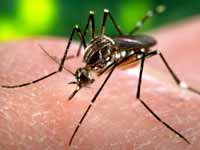China's health minister said Tuesday the A(H1N1) flu situation in the world's most populous nation was "grim," as the number of cases surged rapidly at the start of the school year, with winter on the way.
The minister, Chen Zhu, told reporters that Beijing would this week launch its nationwide vaccination programme, making it the first country in the world to do so, but warned that supply would likely fall far short of demand.
"There are recent developments in A(H1N1) flu and we are faced with a grim situation," Chen told reporters. He said there had been a sudden surge in cases, emphasising that in the past week, 95 percent of new infections were domestic and not imported from abroad.
There had also been a fast rise in cluster outbreaks, Chen said, with the start of the new academic year bringing students together in close proximity.
China has so far reported 5,592 cases of A(H1N1) flu but no deaths.
The World Health Organization (WHO) said Friday that at least 2,837 people had died from A(H1N1) flu globally.
Authorities are particularly concerned there will be a second wave of the pandemic with the onset of the autumn and winter flu season in the northern hemisphere.
Chen said an additional worry was the upcoming week-long October national holiday, with huge celebrations marking the 60th anniversary of the founding of communist China and 200 million people expected to travel around the country.
"China will be facing a grim situation in the prevention and control of the A(H1N1) flu," he said.
The government plans to vaccinate 65 million people, or five percent of the total population, before year's end. But Chen warned the production capacity of Chinese vaccine companies was limited.
"The supply will fall far short of demand if compared to the demand of 1.3 billion people," he said.
Chen said priority would be given to children aged five to 19, those with chronic respiratory and cardiovascular diseases, medical workers, quarantine officials, those working in railway and aviation sectors, soldiers and police.
He added Chinese authorities were following the progress of clinical trials abroad with regards to vaccines for pregnant women.
Earth becoming a disease hot spot : The warming earth is making us sick. Rising temperatures, frequent floods and prolonged droughts are ideal conditions for infectious diseases to spread. "Global warming is fuelling epidemics in areas which are unprepared. We're seeing the emergence of new diseases around the world. Old diseases are also coming back with a vengeance," Climate change has dramatically changing infection trends.
DENGUE DEATH CASES INCREASES BY 65% IN 2010
SAVE THE WORLD - STOP GLOBAL WARMING

Either You're With Me or You're Against Me in Stopping Global Warming!
Global Warming Articles
Let's Go Green & Save The World : Mentor Gemilang
The Truth Hurts - Truth is such a rare thing, it is delighted to tell it.

You can fool some of the people all of the time, and all of the people some of the time, but you can not fool all of the people all of the time.
Most truths are so naked that people feel sorry for them and cover them up, at least a little bit.
Truth always rests with the minority, and the minority is always stronger than the majority, because the minority is generally formed by those who really have an opinion, while the strength of a majority is illusory, formed by the gangs who have no opinion
Let's Go Green - Mentor Gemilang 1 - Visitors from 90 Countries
LATEST NEWS
Are u protected against Influenza A(H1N1)?
Repentance (At Taubah)
We can never be perfect since even prophets have at times made mistakes. Repentance means to abandon one's rebelliousness and arrogance before God and to stop deliberately disregarding His commandments without feeling any shame. Repentance also means to humbly hope for the mercy of God and to fear His judgment while doing the best one can to fulfill divine wishes within the limits of one's human weaknesses.


